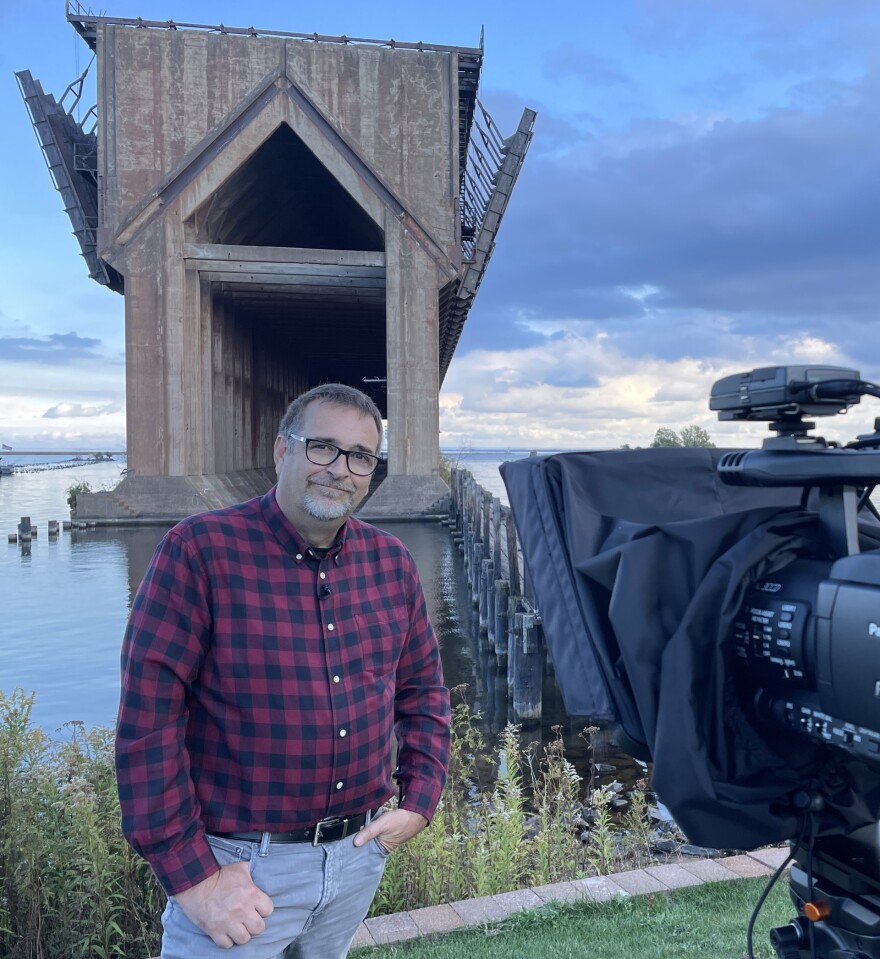Mixter's conversation with WCMU's Tina Sawyer started with him explaining what he thinks really happened to the Fitzgerald.
This transcript has been lightly edited for clarity and length. Listen to this conversation by clicking the LISTEN play button above.
Ric Mixter Just from my visit down there and from also interviews of the Coast Guard, interviews with the people who searched for where it might have run aground, it's pretty clear that it was just a catastrophic failure on the surface and broke into two large pieces in the midsection, just disintegrated onto the bottom. So it's still a puzzle you don't know for sure, and because it's very limited access, it remains a mystery even today, some 50 years since it was lost.

Tina Sawyer So it wasn't weather conditions or anything like that or what did that come into play?
RM Oh yeah. You, you have to blame the storm. I mean, it wasn't the worst storm that ever hit the Great Lakes. We've seen almost twice the amount of wind come out for the storm of 1940. We had 12 ships vanish with all of their crews in 1913. But it was a bad storm that led to the ship breaking up. So the question was, was it also maintenance? Was it the fact that the captain pushed through almost four other storms that season alone, and they knew that the keel had been loosened by this captain, that would keep pushing through these storms. So how much of it was that? The storm certainly was the coup de grace. The sad fact that big Wave came up and crushed her hatch as she could no longer stay buoyant.
TS Did it happen so fast they weren't able to get off the boat?
RM It did. That's been the big, intriguing mystery. And probably, like Gordon Lightfoot wrote the song, was that 29 people simply vanished. And if you think of the major storms and the big freighters that have gone down, the largest wreck in Lake Michigan, the Carl Bradley , had two survivors and many of the people were recovered. And the question is, why did the Fitzgerald have no survivors and everybody vanished? And that led to all kinds of speculation, including the National Enquirer, which said that aliens must have taken the crews. And then when Gordon Lightfoot saw the story and wrote the song that put it into legendary status.
TS And so we know where it's at. You weren't able to find any bodies down there when you were there?

RM Our dive made headlines around the world because we found the first missing crewman, and that was the dive right after mine. And then a young man went down with his father. He was going to write a report about the Edmund Fitzgerald and we just figured he would see what we saw and that was just taconite and wreckage on the bottom. And sadly, he found the first missing crewman who was wearing a life jacket. And that, of course, not only solved many of the questions that we had as to whether or not the crew knew, it also came to really break open, you know, maybe that perhaps they were all just buried inside the wreck. So we have to keep that in the back of our mind. But it's also part of what happens on a shipwreck, and we have to be real to that as well.
TS Is there anything you'd like to say that I haven't asked a question about?
RM I guess it's just, you know, it's wonderful that we have a commemoration for the Fitzgerald, but there's so many other storms that have major commemorations that are coming up with the November Gales. We lost 12 ships in 1913. We lost 4 ships in 1940. We lost the Daniel J Morrell and the Bradley and all of those never got a song from Gordon Lightfoot! So it'd be much better to make sure that we remember that these lakes are dangerous, that every fall, these men and women that are out there today are taking a risk, but of course with the new technology that we have, we probably won't see a major wreck like this. And I hope that we never do. But it's important to remember that there are risks on the lakes and there's people who regularly bring that cargo through.
Mixter will be giving a talk on the Edmund Fitzgerald this Sunday at the Alma Public Library.


